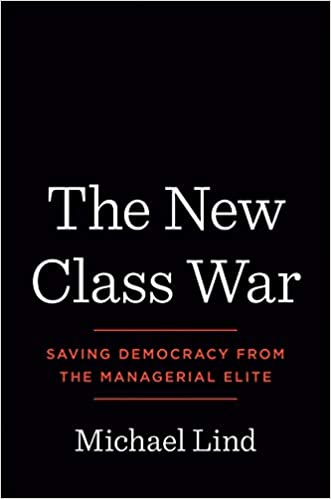You have /5 articles left.
Sign up for a free account or log in.
 The New Class War: Saving Democracy from the Managerial Elite by Michael Lind
The New Class War: Saving Democracy from the Managerial Elite by Michael Lind
Published in January of 2020.
I’m not sure if it is possible to separate a discussion of The New Class War from the COVID-19 pandemic.
Almost any book on society, economics, and politics written before the Coronavirus changed everything about American life is guaranteed to read as dated.
Still, it is not fair to Michel Lind (or any author) to criticize their book because its arguments are now less relevant in this time of stay-at-home orders and over-run hospitals.
Reading The New Class War does provoke some questions about the role of books within, and after, a pandemic. So many of the trends, policies, and events that seemed so crucial as late as three months ago feel somewhat trivial now.
Will nonfiction as a genre need a re-set, now that so much of the imagination of dystopian science fiction has come to pass?
Is there a reason to still pick up, and pick apart, The New Class War?
I’ll answer that question with a qualified “yes.”
It is the books that you disagree with that often teach you the most. I think Lind is wrong in most of his arguments about the origins and likely outcomes of the economics and politics that led to Trump’s election. This does not make his ideas any less interesting or provocative.
Lind, a professor at UT Austin and the co-founder of the New America Foundation (now New America), views the last few decades as one long ascent of the managerial elite overclass.
According to Lind, expensively educated and lavishly credentialed knowledge workers have captured political, cultural, and economic power at the expense of the working class.
The forces that once checked the power of managerial elite - unions and churches and bowling leagues - have all receded from prominence and influence.
For Lind, the election of Trump in 2016 was less about intolerance or fear, and more a legitimate reaction of a working-class (mostly white) that has been systematically denied cultural legitimacy and economic security.
The problem with this argument is that it places the blame for the rise of populist politicians on those most likely to oppose their policies and to support measures that would benefit the working class.
Staying within the academic circles that I run in, mainstream beliefs include the idea that healthcare should be extended to all Americans, and that more public dollars should flow to public education.
How voting for politicians who favor increases in the minimum wage translates into anti-working class actions is never explained in The New Class War.
Reasonable questions can be asked about the commitment of highly educated professionals to reducing structural inequalities.
Are we doing enough to push for adequate funding of community colleges and other public institutions?
Are we aware of the impact of funding public K-12 schools mostly based on local property taxes?
Have we supported local zoning regulations and funding policies that increase the supply of affordable housing?
If our goal is to move towards a more equitable society, one in which the benefits of economic life are more evenly distributed, then I’m not sure how blaming educated professionals for the rise of populist politics offers much help. Better to engage in the hard work of policymaking that benefits those with the least resources and the fewest options.
The New Class War makes a provocative argument about how we arrived at our current state of political, cultural, and economic polarization.
You will have to read the book yourself to see if you are convinced about the causes, and likely consequences, of America’s new class divide.
How does the pandemic change your approach to reading nonfiction?
What are you reading?




